This week, we revisit growers from Carlow, Tipperary and Donegal. Harvest is well and truly under way in the south, with winter barley and oats now complete after record early starts. Things are maturing at a normal pace in the northwest, however, as winter barley is only now coming close to harvesting. Recent rain could now cause issues for the ongoing cereal harvest but is welcomed from potato producers. Stephen Robb reports.
Busherstown,
Co Carlow
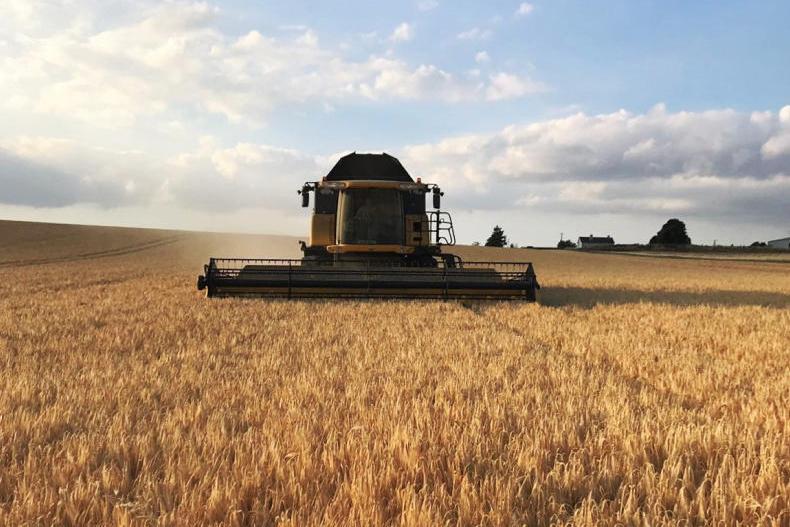
Larry Doyle harvesting winter barley with his New Holland CX8080 with a 25ft head.
Last Sunday marked the first real shower of rain in Busherstown over the past number of months but now that harvest 2018 has begun, rain could end up causing more damage than good, explains Larry.
The winter barley harvest began on 10 July, the earliest that Larry can recall, and was complete three days later. Like many winter crops, the hot weather accelerated ripening and as a result, yields were back, grains were pale in colour and they hadn’t filled as well as a normal year. Straw is also whitish/pink in colour. There were a number of green grains in the sample this year due to a small amount of secondary tillering.
High temperatures at the time of harvest have also been an issue. High grain temperatures meant that he has had to move piles a number of times to allow the grain to cool before installing pedestals.
Lightning strikes
On a stormy night towards the end of May, a lightning strike caused significant damage to Larry’s weighbridge. Lightning blew the weight cells and display of his Avery overground weighbridge, which was only discovered at the start of harvest.
Larry’s gluten-free oats will be harvested by Glanbia within the week as the crop is now ripe.
“It’s hard to know about yield but it’s bound to be effected by the weather.” The winter wheat is also ripening at an alarming rate and it now looks likely that the crop will be harvested within the next two weeks. This will be the first time Larry’s wheat will ever be harvested in July.
His spring beans are dying off up to a month early due to drought conditions. The pods are low in the crop and the beans haven’t had a chance to fill properly. However the crop has received no fungicide sprays all year.
Somewhat of a reverse has occurred with his spring barley crops as the later-sown crops now appear to be withstanding the worst of the drought, with earlier-sown crop under significant pressure.
“I’d hope we don’t get the opposite weather now as it could make harvesting the spring crops very difficult”.
Clonmel,
Co Tipperary
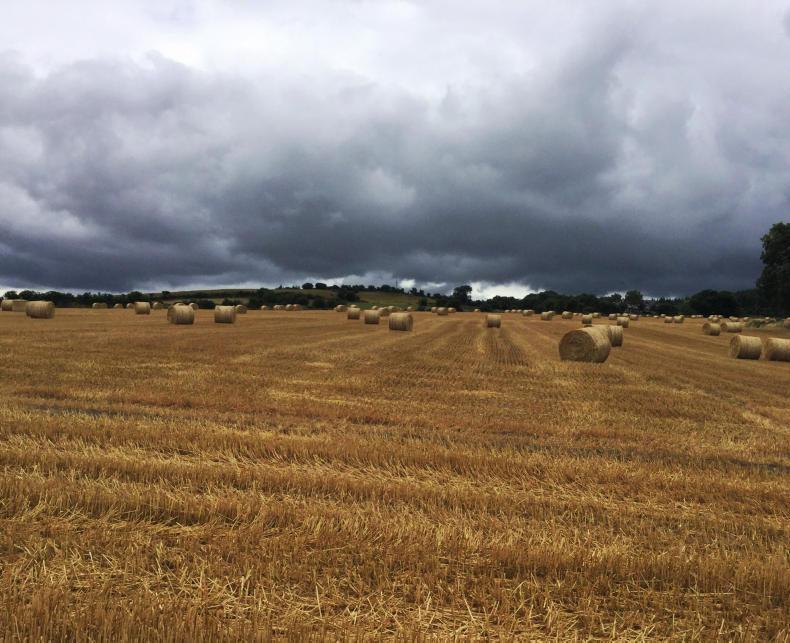
Winter barley straw yields were good this year but winter oats yields appeared to be down.
The uninterrupted dry spell in Clonmel was also broken last Sunday as the area received its first rainfall since June 14. The few showers that did fall had little-to-no effect however, explains John. The winter barley harvest began on 3 July, the earliest that John can recall and was finished four days later. “The harvest surely started 17 days earlier than normal”. A blocked control valve on the 16ft header of John’s Deutz Fahr 4075 combine meant that the harvest was delayed for a day.
The winter barley averaged 4.1t/ac across the farm at around 16.8% moisture. Average bushel weights came in at 64.5KPH. His Belfry crop had screenings of between 6.3-7% but screenings from his Bazooka crop were as low as 2%. Winter barley straw yields are excellent this year.
John also finished harvesting his winter oats last Friday after the earliest ever start date. “Normally if we start the harvest around the 14th-15th I’d consider it early, now we’re finished well before that.” His oats averaged 3.25t/ac at 13% moisture with average bushel weights of 54.5KPH. Despite the drought impact John is still pleased with how it performed. Oaten straw yields appear down on last year according to John.
Optimistic about winter wheat
John’s winter wheat is still on track for a reasonable yield. “I think the fine weather suits the wheat, it has a good course head on it and is filling well,” explains John. The crop is just beginning to turn and is around two weeks away from harvest. John has topped off his fodder beet with N this week.
The crop is very clean and the final weed spray of Wizard (2.5l/ha), Target (1.2l/ha), Falcon (0.8l/ha), Maxbor (3.0l/ha) and 1.0l/ha of oil was applied at the end of June. The Rosalinda variety is very upright, meaning the rows have been slow to close.
John’s spring barley received a head spray of Priaxor (0.65l/ha), venture extra (0.65l/ha), Bravo (1.0l/ha) and EPSO Combitop (5.0kg/ha). John is not expecting to match the average farm yield this year.
“Beet needs some rain but spring barley is passed it at this stage.”
Cloon,
Co Donegal
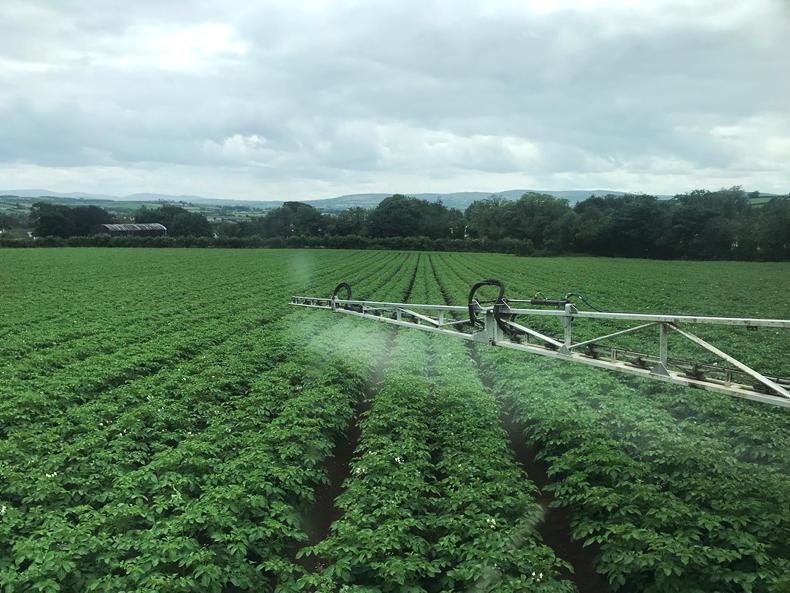
Jamie spraying non-irrigated Saxon potatoes, which are starting to flower before the rows close.
Recent rain in the northwest has been a welcome sight for potato producers who, for the last three to four weeks, have been under significant pressure dealing with the consequences of drought on this season’s potato crops. Around 17mm of rain fell last Sunday which, while welcome, won’t be enough to make a meaningful impact to the soil moisture deficits.
Jamie, like many potato producers in the area, is now entering his fourth consecutive week of irrigating his crop. The last time his irrigation equipment was used was in 2013 and as a result, took some time to get the equipment working properly again. Jamie also had to invest in another irrigation systems as a result of the drought, although he only has capacity to cover 50% of the crop.
Using a rain gun system, the irrigators can cover a maximum width of 76m. The irrigators move up to 30m per hour, with forward motion powered by water pressure which is being pumped from the water source.
The equipment is capable of covering up to 16 acres per day, depositing between 16 and 25mm of water depending on the crop.
A challenging time
Irrigating seven days a week, while expensive, is also extremely demanding and like many other producers, the workload is taking its toll on everyone involved in the operation.
Irrigation starts at 5-6am in the morning and finishes between 11 and 12pm at night. Tractors must be manned at all stages of the day.
The difference between the crops which are irrigated and those which are not isstark. As potatoes are 80% water, those which have not received moisture are suffering. “The foliage actually appears to be decreasing on those crops,” explains Jamie. The non-irrigated crops have taken on a real deep green/blue color due to stress.
Jamie is 10 days away from desiccating his first early main crop potatoes. Jamie’s winter barley is nearly ready to be harvested once the weather allows.
“We’re around three weeks behind the south in terms of drought.
“The recent over cast conditions have helped things, at least the water isn’t just evaporating.”
Read more
Harvest18: winter barley wrapping up as focus moves to oats
From the tramlines: harvest starts as dry weather continues to bite
This week, we revisit growers from Carlow, Tipperary and Donegal. Harvest is well and truly under way in the south, with winter barley and oats now complete after record early starts. Things are maturing at a normal pace in the northwest, however, as winter barley is only now coming close to harvesting. Recent rain could now cause issues for the ongoing cereal harvest but is welcomed from potato producers. Stephen Robb reports.
Busherstown,
Co Carlow

Larry Doyle harvesting winter barley with his New Holland CX8080 with a 25ft head.
Last Sunday marked the first real shower of rain in Busherstown over the past number of months but now that harvest 2018 has begun, rain could end up causing more damage than good, explains Larry.
The winter barley harvest began on 10 July, the earliest that Larry can recall, and was complete three days later. Like many winter crops, the hot weather accelerated ripening and as a result, yields were back, grains were pale in colour and they hadn’t filled as well as a normal year. Straw is also whitish/pink in colour. There were a number of green grains in the sample this year due to a small amount of secondary tillering.
High temperatures at the time of harvest have also been an issue. High grain temperatures meant that he has had to move piles a number of times to allow the grain to cool before installing pedestals.
Lightning strikes
On a stormy night towards the end of May, a lightning strike caused significant damage to Larry’s weighbridge. Lightning blew the weight cells and display of his Avery overground weighbridge, which was only discovered at the start of harvest.
Larry’s gluten-free oats will be harvested by Glanbia within the week as the crop is now ripe.
“It’s hard to know about yield but it’s bound to be effected by the weather.” The winter wheat is also ripening at an alarming rate and it now looks likely that the crop will be harvested within the next two weeks. This will be the first time Larry’s wheat will ever be harvested in July.
His spring beans are dying off up to a month early due to drought conditions. The pods are low in the crop and the beans haven’t had a chance to fill properly. However the crop has received no fungicide sprays all year.
Somewhat of a reverse has occurred with his spring barley crops as the later-sown crops now appear to be withstanding the worst of the drought, with earlier-sown crop under significant pressure.
“I’d hope we don’t get the opposite weather now as it could make harvesting the spring crops very difficult”.
Clonmel,
Co Tipperary

Winter barley straw yields were good this year but winter oats yields appeared to be down.
The uninterrupted dry spell in Clonmel was also broken last Sunday as the area received its first rainfall since June 14. The few showers that did fall had little-to-no effect however, explains John. The winter barley harvest began on 3 July, the earliest that John can recall and was finished four days later. “The harvest surely started 17 days earlier than normal”. A blocked control valve on the 16ft header of John’s Deutz Fahr 4075 combine meant that the harvest was delayed for a day.
The winter barley averaged 4.1t/ac across the farm at around 16.8% moisture. Average bushel weights came in at 64.5KPH. His Belfry crop had screenings of between 6.3-7% but screenings from his Bazooka crop were as low as 2%. Winter barley straw yields are excellent this year.
John also finished harvesting his winter oats last Friday after the earliest ever start date. “Normally if we start the harvest around the 14th-15th I’d consider it early, now we’re finished well before that.” His oats averaged 3.25t/ac at 13% moisture with average bushel weights of 54.5KPH. Despite the drought impact John is still pleased with how it performed. Oaten straw yields appear down on last year according to John.
Optimistic about winter wheat
John’s winter wheat is still on track for a reasonable yield. “I think the fine weather suits the wheat, it has a good course head on it and is filling well,” explains John. The crop is just beginning to turn and is around two weeks away from harvest. John has topped off his fodder beet with N this week.
The crop is very clean and the final weed spray of Wizard (2.5l/ha), Target (1.2l/ha), Falcon (0.8l/ha), Maxbor (3.0l/ha) and 1.0l/ha of oil was applied at the end of June. The Rosalinda variety is very upright, meaning the rows have been slow to close.
John’s spring barley received a head spray of Priaxor (0.65l/ha), venture extra (0.65l/ha), Bravo (1.0l/ha) and EPSO Combitop (5.0kg/ha). John is not expecting to match the average farm yield this year.
“Beet needs some rain but spring barley is passed it at this stage.”
Cloon,
Co Donegal

Jamie spraying non-irrigated Saxon potatoes, which are starting to flower before the rows close.
Recent rain in the northwest has been a welcome sight for potato producers who, for the last three to four weeks, have been under significant pressure dealing with the consequences of drought on this season’s potato crops. Around 17mm of rain fell last Sunday which, while welcome, won’t be enough to make a meaningful impact to the soil moisture deficits.
Jamie, like many potato producers in the area, is now entering his fourth consecutive week of irrigating his crop. The last time his irrigation equipment was used was in 2013 and as a result, took some time to get the equipment working properly again. Jamie also had to invest in another irrigation systems as a result of the drought, although he only has capacity to cover 50% of the crop.
Using a rain gun system, the irrigators can cover a maximum width of 76m. The irrigators move up to 30m per hour, with forward motion powered by water pressure which is being pumped from the water source.
The equipment is capable of covering up to 16 acres per day, depositing between 16 and 25mm of water depending on the crop.
A challenging time
Irrigating seven days a week, while expensive, is also extremely demanding and like many other producers, the workload is taking its toll on everyone involved in the operation.
Irrigation starts at 5-6am in the morning and finishes between 11 and 12pm at night. Tractors must be manned at all stages of the day.
The difference between the crops which are irrigated and those which are not isstark. As potatoes are 80% water, those which have not received moisture are suffering. “The foliage actually appears to be decreasing on those crops,” explains Jamie. The non-irrigated crops have taken on a real deep green/blue color due to stress.
Jamie is 10 days away from desiccating his first early main crop potatoes. Jamie’s winter barley is nearly ready to be harvested once the weather allows.
“We’re around three weeks behind the south in terms of drought.
“The recent over cast conditions have helped things, at least the water isn’t just evaporating.”
Read more
Harvest18: winter barley wrapping up as focus moves to oats
From the tramlines: harvest starts as dry weather continues to bite










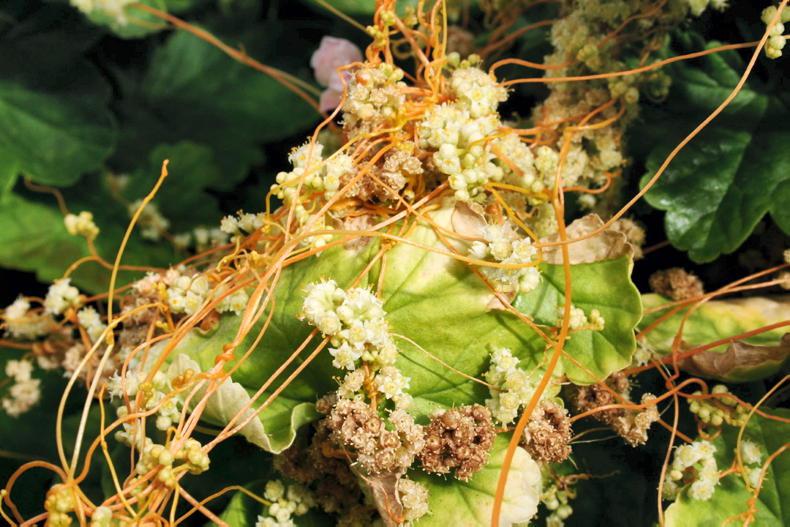
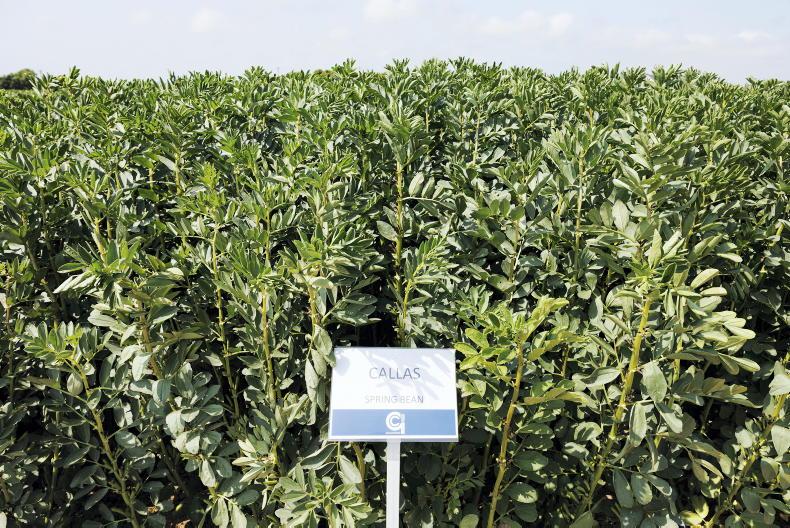


SHARING OPTIONS